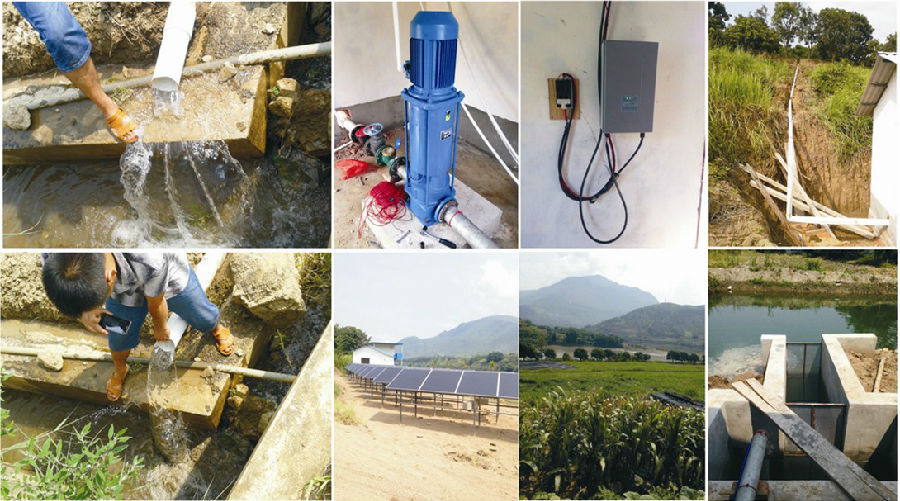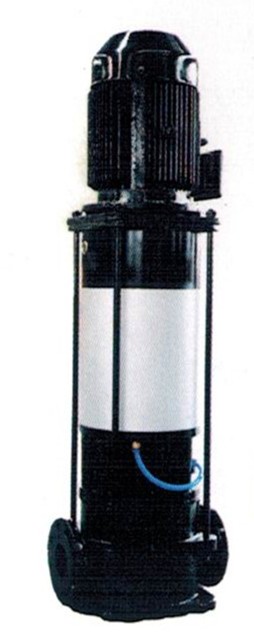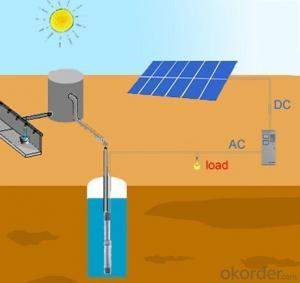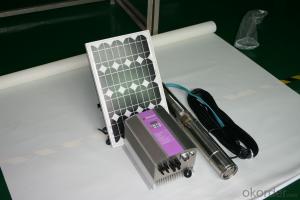Solar Pump Manufacturers L3D-5.5-320 Solar Water Pump
- Loading Port:
- China Main Port
- Payment Terms:
- TT OR LC
- Min Order Qty:
- -
- Supply Capability:
- 300 sets unit/month
OKorder Service Pledge
OKorder Financial Service
You Might Also Like
Product description:
Product: Solar water pump
Model:L3D-5.5-320
 Appilication:
Appilication:
surface pump
for surface water of pond, river, lake
for irrigation of a big farm with3000 m2 on the top of a high mountain
Product specification:
flow rate:5.5m3/ hour, 44m3/day.
lift: 10m-320m
pump diameter: 296mm
Pump installed on the ground, outlet to the water surface:4m
with AC motor, motor power:5.5kW
but only need solar power:6kW(while Grundfos pump needs at least 25kW solar power, our pump can save more than 70% solar panel power,save USD12000 cost for solar panel per set.
Material:
Pump inside: stainless steel and wearable nylon,it enables our solar pump to have 10 years sevice life.
Motor : AC motor, 380V , three phase , 50Hz. The pump also can connect with grid power directly.
Certification:
3 International patent
ISO9001
CE
Warranty:2 years
- Q: Can a solar pump be used for irrigation in hilly or sloping terrains?
- Yes, a solar pump can be used for irrigation in hilly or sloping terrains. Solar pumps are versatile and can be installed in various locations, including hilly or sloping terrains. These pumps use solar energy to power them, which means they do not require a connection to the grid or fuel to operate. This makes them highly suitable for remote and challenging terrains. Additionally, solar pumps can be installed at different levels to cater to the varying terrain, ensuring efficient water distribution across the slope. They can provide a sustainable and environmentally friendly solution for irrigation needs in such terrains, reducing the reliance on conventional energy sources and minimizing the carbon footprint.
- Q: Are solar pumps suitable for use in orchards?
- Yes, solar pumps are suitable for use in orchards. Solar-powered pumps provide a sustainable and cost-effective solution for irrigation needs in orchards, as they utilize clean and renewable energy from the sun. They can effectively supply water to fruit trees, ensuring proper hydration and maximizing crop yield while reducing operating costs and environmental impact.
- Q: Can a solar pump be used for firefighting or emergency water supply?
- Yes, a solar pump can be used for firefighting or emergency water supply. Solar pumps are powered by sunlight, so they do not require electricity from the grid or fuel to operate. This makes them an ideal solution for remote locations or during power outages. Solar pumps can be used to extract water from wells, rivers, or other water sources and can provide a reliable supply of water for firefighting or emergency situations. Additionally, solar pumps are environmentally friendly as they do not produce greenhouse gas emissions or require fossil fuels. However, it is important to ensure that the solar pump has the necessary capacity and capabilities to meet the specific requirements of firefighting or emergency water supply.
- Q: Can a solar pump be used for wastewater management?
- Yes, a solar pump can be used for wastewater management. Solar pumps are a sustainable and energy-efficient solution for various water-related applications, including wastewater management. These pumps harness solar energy to power their operation, eliminating the need for electricity from the grid or fuel. Solar pumps can be utilized for pumping wastewater from septic tanks, sewage treatment plants, or other wastewater treatment systems. They can transfer wastewater to treatment facilities, irrigation systems, or even natural water bodies for proper management and disposal. The use of solar pumps for wastewater management offers several advantages. Firstly, they significantly reduce operating costs as they do not require electricity or fuel, thereby providing long-term cost savings. Additionally, solar pumps are environmentally friendly, as they produce zero greenhouse gas emissions compared to traditional pumps powered by electricity or fossil fuels. Moreover, solar pumps are reliable and can operate even in remote areas where access to electricity might be limited. They are also low-maintenance, with fewer moving parts, reducing the need for frequent repairs or replacements. In conclusion, solar pumps are a feasible and sustainable option for wastewater management. They provide a reliable, cost-effective, and environmentally friendly solution that can be implemented in various settings, contributing to effective wastewater treatment and disposal.
- Q: How does a solar pump handle water with high iron content?
- A solar pump can handle water with high iron content by utilizing filtration systems and iron removal techniques. These pumps typically include pre-filters and sediment traps to remove large particles and sediments, and some models also incorporate iron removal systems like water softeners or oxidation filters. These mechanisms help prevent clogging, corrosion, and damage to the pump components, ensuring efficient water flow and operation even with water containing high iron content.
- Q: Can a solar pump be used in conjunction with a battery?
- A solar pump can indeed be utilized in tandem with a battery. Numerous solar-powered systems, in fact, employ batteries to store surplus energy produced by the solar panels during daylight hours. Consequently, this stored energy can subsequently be harnessed to fuel the pump during nighttime or in the absence of sunlight. The battery functions as a backup power reservoir, guaranteeing uninterrupted operation of the pump even when sunlight is unavailable. This fusion of a solar pump and a battery offers a dependable and sustainable remedy for water pumping, particularly in regions where the provision of electricity is erratic or unattainable.
- Q: Are solar pumps suitable for use in desert areas?
- Yes, solar pumps are highly suitable for use in desert areas. The abundance of sunlight in desert regions makes solar energy a reliable and efficient power source for operating pumps. Additionally, solar pumps are cost-effective, environmentally friendly, and can help meet the water needs of desert communities by harnessing the sun's energy to extract water from underground sources or distribute water for irrigation purposes.
- Q: Can a solar pump be used for water supply in disaster relief operations?
- Yes, a solar pump can be used for water supply in disaster relief operations. Solar pumps are efficient, reliable, and require no external power source, making them ideal for areas with limited or damaged infrastructure. They can provide a sustainable and continuous water supply, helping to meet the urgent needs of affected communities during disaster relief operations.
- Q: How does the distance between the solar panel and the pump affect the performance of a solar pump?
- The distance between the solar panel and the pump can have an impact on the performance of a solar pump. The longer the distance, the more energy loss can occur due to resistance in the cables and wiring. This can result in decreased efficiency and lower water pumping capacity. Therefore, it is important to minimize the distance between the solar panel and the pump to ensure optimal performance.
- Q: How does a solar pump handle water level fluctuations in wells or boreholes?
- A solar pump handles water level fluctuations in wells or boreholes by automatically adjusting its operation based on the available sunlight and water level. When the sun is shining, the solar panels provide power to the pump, which lifts water from the well or borehole to the surface. If the water level drops due to high demand or drought, the pump will slow down or shut off to prevent running dry. Conversely, when the water level rises, the pump will increase its speed to match the higher water level. This intelligent control system ensures that the solar pump can effectively handle water level fluctuations while maximizing its efficiency and protecting the well or borehole from damage.
Send your message to us
Solar Pump Manufacturers L3D-5.5-320 Solar Water Pump
- Loading Port:
- China Main Port
- Payment Terms:
- TT OR LC
- Min Order Qty:
- -
- Supply Capability:
- 300 sets unit/month
OKorder Service Pledge
OKorder Financial Service
Similar products
Hot products
Hot Searches
Related keywords



















